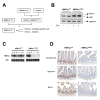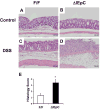Hepatocyte nuclear factor 4alpha in the intestinal epithelial cells protects against inflammatory bowel disease
- PMID: 18338782
- PMCID: PMC2435391
- DOI: 10.1002/ibd.20413
Hepatocyte nuclear factor 4alpha in the intestinal epithelial cells protects against inflammatory bowel disease
Abstract
Background: Hepatocyte nuclear factor 4alpha (HNF4alpha; NR2A1) is an orphan member of the nuclear receptor superfamily expressed in liver and intestine. While HNF4alpha expression is critical for liver function, its role in the gut and in the pathogenesis of inflammatory bowel disease (IBD) is unknown.
Methods: Human intestinal biopsies from control and IBD patients were examined for expression of mRNAs encoding HNF4alpha and other nuclear receptors. An intestine-specific HNF4alpha null mouse line (Hnf4alpha(DeltaIEpC)) was generated using an Hnf4alpha-floxed allele and villin-Cre transgene. These mice and their control floxed counterparts (Hnf4alpha(F/F)), were subjected to a dextran sulfate sodium (DSS)-induced IBD colitis protocol and their clinical symptoms and gene expression patterns determined.
Results: In human intestinal biopsies, HNF4alpha was significantly decreased in intestinal tissues from Crohn's disease and ulcerative colitis patients. HNF4alpha expression was also suppressed in the intestine of DSS-treated mice. In Hnf4alpha(DeltaIEpC) mice, disruption of HNF4alpha expression was observed in the epithelial cells throughout the intestine. In the DSS-induced colitis model Hnf4alpha(DeltaIEpC) mice showed markedly more severe changes in clinical symptoms and pathologies associated with IBD including loss of body weight, colon length, and histological morphology as compared with Hnf4alpha(F/F) mice. Furthermore, the Hnf4alpha(DeltaIEpC) mice demonstrate a significant alteration of mucin-associated genes and increased intestinal permeability, which may play an important role in the increased susceptibility to acute colitis following an inflammatory insult.
Conclusions: While HNF4alpha does not have a major role in normal function of the intestine, it protects the gut against DSS-induced colitis.
Figures








References
-
- Podolsky DK. Inflammatory bowel disease. N Engl J Med. 2002;347:417–429. - PubMed
-
- Bouma G, Strober W. The immunological and genetic basis of inflammatory bowel disease. Nat Rev Immunol. 2003;3:521–533. - PubMed
-
- Froicu M, Weaver V, Wynn TA, et al. A crucial role for the vitamin D receptor in experimental inflammatory bowel diseases. Mol Endocrinol. 2003;17:2386–2392. - PubMed
-
- Lim WC, Hanauer SB, Li YC. Mechanisms of disease: vitamin D and inflammatory bowel disease. Nat Clin Pract Gastroenterol Hepatol. 2005;2:308–315. - PubMed
-
- Dubuquoy L, Jansson EA, Deeb S, et al. Impaired expression of peroxisome proliferator-activated receptor gamma in ulcerative colitis. Gastroenterology. 2003;124:1265–1276. - PubMed
Publication types
MeSH terms
Substances
Grants and funding
LinkOut - more resources
Full Text Sources
Other Literature Sources
Medical
